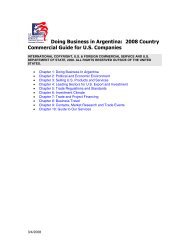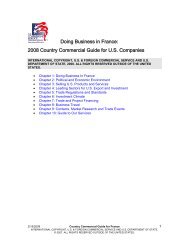Doing Business In Saudi Arabia - Bna
Doing Business In Saudi Arabia - Bna
Doing Business In Saudi Arabia - Bna
You also want an ePaper? Increase the reach of your titles
YUMPU automatically turns print PDFs into web optimized ePapers that Google loves.
Foreign-Exchange Controls Return to top<br />
<strong>Saudi</strong> <strong>Arabia</strong> imposes no foreign exchange restrictions on capital receipts or payments<br />
by residents or nonresidents, beyond a prohibition against transactions with Israel.<br />
Although officially linked to the IMF’s Special Drawing Rights, <strong>Saudi</strong> <strong>Arabia</strong> in practice<br />
pegs its currency, the <strong>Saudi</strong> Riyal, to the U.S. Dollar.<br />
<strong>Saudi</strong> <strong>Arabia</strong> last devalued the Riyal in June 1986 when it set the official selling rate at<br />
SR 3.745 = $1. Residents of <strong>Saudi</strong> <strong>Arabia</strong> may freely and without license buy, hold,<br />
sell, import, and export gold, with the exception of gold of 14 karats or less.<br />
<strong>In</strong> its latest Article IV consultation with <strong>Saudi</strong> <strong>Arabia</strong>, the <strong>In</strong>ternational Monetary Fund<br />
(IMF) indicated that it “saw merit in the authorities’ decision to keep the current pegged<br />
exchange rate regime unchanged in the period leading up to the GCC monetary union<br />
in 2010, while keeping an open mind about the choice of the exchange rate regime<br />
under the prospective monetary union”.<br />
U.S. Banks and Local Correspondent Banks Return to top<br />
There are no U.S. financial/lending institutions operating independently in <strong>Saudi</strong><br />
<strong>Arabia</strong>. Nonetheless, the <strong>Saudi</strong> <strong>Arabia</strong>n Monetary Agency (SAMA) granted licenses to<br />
JP Morgan, Morgan Stanley, Ernst & Young, Merrill Lynch, and Goldman Sachs to<br />
operate in <strong>Saudi</strong> <strong>Arabia</strong> as a foreign investment banking entity.<br />
Currently, 12 majority <strong>Saudi</strong>-owned banks and five regional banks are licensed to<br />
operate in <strong>Saudi</strong> <strong>Arabia</strong>. The regional banks include Emirates Bank, Gulf <strong>In</strong>ternational<br />
Bank, Muscat bank, National Bank of Bahrain, and the National Bank of Kuwait.<br />
The <strong>Saudi</strong> <strong>Arabia</strong>n Monetary Agency (SAMA) also granted licenses to international<br />
investment banks, including, Deutsche Bank, BNP-Paribas, J.P. Morgan, the State<br />
Bank of <strong>In</strong>dia, and the National Bank of Pakistan to open a branch office.<br />
Because of its ownership structure, <strong>Saudi</strong> <strong>In</strong>vestment Bank has direct correspondent<br />
relationships with its U.S. joint venture partner (J.P. Morgan Chase). Other <strong>Saudi</strong><br />
banks also have correspondent relationships with U.S. institutions, whether the home<br />
office in the United States or through the U.S. bank branches in Europe, Bahrain, or<br />
Dubai.<br />
Project Financing Return to top<br />
Project financing is expanding with a multitude of projects in the oil, petrochemicals,<br />
telecommunications, and water and power sectors. Even though local banks are<br />
awash with liquidity, they will not be able to accommodate the volume of deals.<br />
5/13/2008












